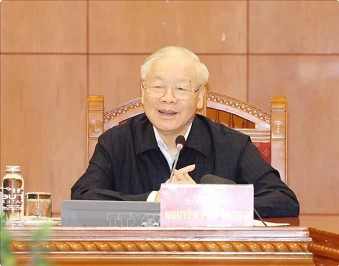
Party General Secretary Nguyen Phu Trong's legacy of socialism model in Vietnam
Latest
 |
| Party General Secretary Nguyen Phu Trong. |
In the cause of socialism building in Vietnam, General Secretary Trong always affirmed the fundamental role of Marxism-Leninism and Ho Chi Minh's thought and emphasised the scientific and revolutionary nature of Marxism - Leninism, as well as nationalism and viewpoints on the role and mission of the people in Ho Chi Minh's thought.
Based on the scientific theoretical research, especially Marxism-Leninism and Ho Chi Minh's thought, combined with a summary of Vietnam's renewal practices and an overview of new theories, the Party leader sketched out Vietnam's model of socialism.
In his article entitled “Some theoretical and practical issues on socialism and the path to socialism in Vietnam,” released on the occasion of the 131st birthday of President Ho Chi Minh (May 19, 1890 - 2021), General Secretary Trong wrote that: “The socialist society that the Vietnamese people are making all efforts to build is a society where the people are well-off, the nation is strong and the people are owners, a society characterised by democracy, equality and civilisation. It possesses a highly developed economy on the basis of a modern productive force and suitable and progressive production relations. It enjoys an advanced culture imbued with national identity. Its people are entitled to wellbeing, freedom and happiness and are blessed with opportunities for comprehensive development. Ethnic groups in the Vietnamese community are equal, united, respectful and supportive of each other to grow together. It has a rule-of-law socialist state of the people, by the people and for the people under the leadership of the Communist Party. And it maintains friendship and cooperation with all countries in the world.”
In the article, along with explaining “What is socialism?”, the Party chief also clarified an important issue of how to build socialism, stressing the need to step up industrialisation and modernisation in conjunction with the development of a knowledge-based economy.
“We must also develop a socialist-oriented market economy, build an advanced culture imbued with national identity, boost human resource development, improve the people's living standards, and exercise social progress and equality. We must safeguard national defence and security, public order and security. We must implement the foreign policy of independence, self-reliance, multilateralisation and diversification for peace, friendship, cooperation and development, and actively engage in international integration. We must build a socialist democracy, harness the will and power of all-nation unity in combination with the power of our time. We must build the socialist rule-of-law state of the people, by the people and for the people. We must build a pure, strong Party and political system in every respect,” according to the leader.
According to Associate Prof. Dr. Bui Dinh Phong of the Ho Chi Minh National Academy of Politics, in the article, Party General Secretary Nguyen Phu Trong affirmed that President Ho Chi Minh and the Communist Party of Vietnam shaped and oriented socialism on the basis of Marxist-Leninist scientific socialism derived from Vietnamese reality, with respect and actions according to objective rules.
The reality of building socialism in the pre-Doi moi (Renewal) period helped the Party gradually gain a more proper, deeper, and more scientific understanding of socialism and the transition period to socialism, Phong said.
The scholar held that the Party chief’s article gave a glance of the situation in Vietnam before Doi moi and after more than 35 years of Doi moi. During this process, Vietnam has still determined that "advancing to socialism is the aspiration of our people and the correct choice of the Communist Party of Vietnam and President Ho Chi Minh, and is in line with the development trajectory of history".
Phong affirmed that through General Secretary Trong’s article, the Party clearly determines that Vietnamese socialism has been and is being built for the benefit of the people, constantly improving the material and spiritual life of the people, and taking the happiness of the people as its goal.
Meanwhile, Associate Prof. Dr. Nguyen Duy Loi, Editor-in-Chief of the Vietnam Social Sciences Magazine under the Vietnam Academy of Social Sciences, commented that thanks to studying the extremely rich reality of the Vietnamese revolution in the decades of Doi moi, General Secretary Nguyen Phu Trong made a very important contribution to clarifying and achieving long strides in political theoretical science, as well as defining and realising the model of socialism and the path to socialism in Vietnam.
Loi held that the legacy that General Secretary Trong left for the posterity is not only a diverse, rich, huge and profound, systematic and comprehensive treasure of political theory science about socialism and the path to socialism in Vietnam, but also a rich treasure of practical experiences of the Vietnamese revolution. Particularly, General Secretary Trong left a shining example of simplicity, morality and personality of a true communist, the scholar stressed.
















